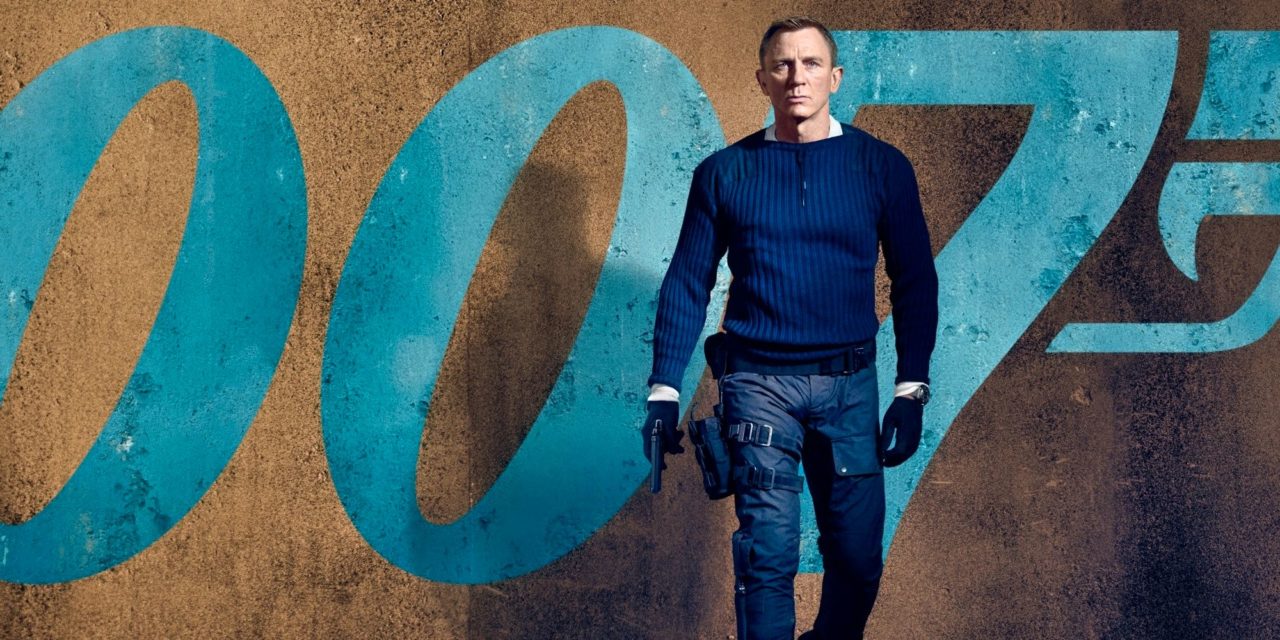Does No Time To Die Successfully Balance the Serious With the Ludicrous?

Seeing No Time to Die after such a long wait, the gargantuan Bond movie can be an overwhelming, and even emotional, experience. But take a step back from the film and its bold choices and you’ll see that it’s a silly movie, from cheesy lines to preposterous storylines. It’s certainly the most ludicrous the series has been since Die Another Day in 2002, although still not quite to that level. Yet No Time to Die is also serving double duty as a Daniel Craig’s final outing as a much more human character explored in the last four serious films. Over its 163-minute run time, the movie often attempts to meld the two tones and styles, and occasionally fully embraces one over the other. Ultimately, does No Time to Die get the mixture right?
 In general, I love the bigger, sillier aspects of the Bond films and am glad the Craig era accepted that style by the end. It’s the execution that varies. No Time to Die is a really entertaining film. It’s not my favourite of Daniel Craig’s Bond entries but it does strike the perfect tone for what I want in a Bond film. People are going to fall on different levels of the stupidity scale but I’d rather have a crazy villain, a bonkers scheme, and bombastic, unrestrained action, as long as it’s done correctly. Craig’s Bond has evolved from a brute to someone with a sense of humour, and the films have changed with him.
In general, I love the bigger, sillier aspects of the Bond films and am glad the Craig era accepted that style by the end. It’s the execution that varies. No Time to Die is a really entertaining film. It’s not my favourite of Daniel Craig’s Bond entries but it does strike the perfect tone for what I want in a Bond film. People are going to fall on different levels of the stupidity scale but I’d rather have a crazy villain, a bonkers scheme, and bombastic, unrestrained action, as long as it’s done correctly. Craig’s Bond has evolved from a brute to someone with a sense of humour, and the films have changed with him.
The first hour of No Time to Die is spectacular. Any issues are yet to come and the emotional pre-credits sequence is balanced well with the increasing scale of the action. The tone of the scenes in Jamaica and Cuba is perfect. It doesn’t feel pretentious and ashamed of the series’ sillier elements like Spectre did. Blofeld has a birthday party where he communicates with his guests via a robotic eye and has set up Bond’s death via a nanobot DNA virus, for goodness’ sake. Such a sequence would be out of place in any of Craig’s other Bond films but here Cary Fukunaga and the writers make it work. There are quips, gadgets, and big action, all while seeing the human side of a retired and lonely Bond coming back into the fold.
 Casino Royale felt like a character exploration first and foremost. No Time to Die instead feels like a big action movie with some character exploration throughout. Its priorities are slightly different and the new film feels like everyone involved was trying to give Craig a proper send off by throwing everything into it. He’s not making any more so put everything ‘Bond’ into this one and try and make it fit. But at its core, No Time to Die is about a relationship, even if it takes excursions for bombast’s sake. Madeleine is the heart of the story and, as a big plus to the film’s serious drama element, she works much better than she did in Spectre. Her and the child represent the serious family drama being tossed around inside the bonkers action film, literally being taken hostage by it, but they end the film unscathed. When Bonds mouths “family” during the third act, the movie manages to make you feel the weight of the word, despite the moment occurring in the middle of a crazy plot.
Casino Royale felt like a character exploration first and foremost. No Time to Die instead feels like a big action movie with some character exploration throughout. Its priorities are slightly different and the new film feels like everyone involved was trying to give Craig a proper send off by throwing everything into it. He’s not making any more so put everything ‘Bond’ into this one and try and make it fit. But at its core, No Time to Die is about a relationship, even if it takes excursions for bombast’s sake. Madeleine is the heart of the story and, as a big plus to the film’s serious drama element, she works much better than she did in Spectre. Her and the child represent the serious family drama being tossed around inside the bonkers action film, literally being taken hostage by it, but they end the film unscathed. When Bonds mouths “family” during the third act, the movie manages to make you feel the weight of the word, despite the moment occurring in the middle of a crazy plot.
No Time to Die’s decision to lean closer to the absurd side of Bond than previous Craig entries, whether you feel it’s successful or not, is absolutely intentional. This isn’t a case of the writers and producers not knowing what they are doing, its them making a deliberate choice. The 25th official Bond film is the most self-aware the franchise has ever been. It’s not falling into tropes because of laziness, but because of love for them. During the climax, Nomi asks the traitorous scientist “What time is it? Time to die!” and then proceeds to kick him into a lake of killer nanobots. It’s an awful, groan-worthy line and the film knows it. The moment is a wink to the Moore films and, as a fan of that era, a welcome one. It’s as if Nomi, the new 007 trying to prove herself, is the personification of the Craig era, beginning as hard and serious before slowly becoming infected by the humour and style of her predecessor.
 However, it has to be said, there are not just winks at the silliness of past films in the franchise but the seriousness too. One of my favourite moments is Bond pushing the Land Rover onto Logan Ash, a brutal revenge killing after he had killed Felix earlier in the film. It very much felt like a callback to For Your Eyes Only, in which Roger Moore’s Bond, in a moment designed to make that version of the character more serious after the pure camp of Moonraker, kicks a car off a cliff to mercilessly murder an unarmed man who has also killed one of his allies. From cineliterate references to quotes from the novels, No Time to Die still embraces the darker aspects of the character and world when it feels it needs to. Being the last in this Craig sub-series, the film is unafraid to put characters in real jeopardy, and you can feel it. Felix’s death is hard to watch and it feels like any other of Bond’s allies could die at any time, which is a sense of darkness only this film in the series could conjure.
However, it has to be said, there are not just winks at the silliness of past films in the franchise but the seriousness too. One of my favourite moments is Bond pushing the Land Rover onto Logan Ash, a brutal revenge killing after he had killed Felix earlier in the film. It very much felt like a callback to For Your Eyes Only, in which Roger Moore’s Bond, in a moment designed to make that version of the character more serious after the pure camp of Moonraker, kicks a car off a cliff to mercilessly murder an unarmed man who has also killed one of his allies. From cineliterate references to quotes from the novels, No Time to Die still embraces the darker aspects of the character and world when it feels it needs to. Being the last in this Craig sub-series, the film is unafraid to put characters in real jeopardy, and you can feel it. Felix’s death is hard to watch and it feels like any other of Bond’s allies could die at any time, which is a sense of darkness only this film in the series could conjure.
Yet I don’t think the throwback to the more absurdist tone and style totally works when it comes to the third act when the film begins to fully revolve around Safin; my major issue with No Time to Die is its villain. Rami Malek delivers a menacing performance and I love the visuals, from the costumes to the Ken Adam-esque sets, but Safin’s motive is confused and confusing. His plan is complete halfway through the movie. He gets his revenge on SPECTRE and that personal drive, and history with Madeleine, is interesting, especially when he feels like a horror villain. But then, because of the film’s predilections for old school Bond, he suddenly wants to kill millions and take over the world. Why, and who are his targets? There’s a dissonance there between the outlandish plot and the previous seriousness of the character. He’s a Craig era villain for the first half and a Moore era villain in the second, and the two don’t mesh.
 So, let’s talk about the ending because that’s the ultimate melding of a preposterous plot and serious character drama. It works for me but I still haven’t decided how well it works. I like the ending because of how it literalises a theme. Bond is cursed; everything he touches dies because of his profession and now that is literally true because a villain with a name that’s essentially Lucifer Satan has forever poisoned him with nanobots that’ll kill his new family. Bond creates pain and suffering, a real Garmonbozia guy, but in the end, he experienced love and can die knowing he created something beautiful which will continue on. It’s stupid and ludicrous on a literal level but the broad strokes and deeper ideas of it work. James embraces his humanity, drops his armour, and chooses to die rather than lose what he has gained.
So, let’s talk about the ending because that’s the ultimate melding of a preposterous plot and serious character drama. It works for me but I still haven’t decided how well it works. I like the ending because of how it literalises a theme. Bond is cursed; everything he touches dies because of his profession and now that is literally true because a villain with a name that’s essentially Lucifer Satan has forever poisoned him with nanobots that’ll kill his new family. Bond creates pain and suffering, a real Garmonbozia guy, but in the end, he experienced love and can die knowing he created something beautiful which will continue on. It’s stupid and ludicrous on a literal level but the broad strokes and deeper ideas of it work. James embraces his humanity, drops his armour, and chooses to die rather than lose what he has gained.
Bond’s death is a good idea, and I’m thankful for the finality and the bold decision, but because it hinges on a fictional technology with made-up rules, it doesn’t quite feel as satisfying as it should. You can nitpick it to death. Why can’t he use his EMP watch to destroy the nanobots? How injured was he from the bullets? Could he have survived anyway? How much of it was a choice? The ‘ticking clock’ of the boats arriving was weak because why not destroy the boats instead of the facility? These questions distract from Bond’s death and its impact. Yet I don’t want to make these complaints because one should embrace the story with the tone it is presented with. It should have been cleaner but the plot knows it is absurd and it needs to be treated as such. It’s in this respect where the serious drama and the preposterousness of the situation feel at odds. It’s trying to be both at once and doesn’t quite succeed. I prefer it as a personal decision rather than Bond sacrificing himself to save millions of nebulous lives. The heart and emotion are there, just buried in layers of excess nonsense. It hits but not as strongly as it could.
Does No Time to Die successfully balance the serious with the knowingly stupid? I find it to be largely successful, especially for the first two acts. It walks the tonal tightrope and stumbles occasionally, almost falling at the end but catching itself, yet not quite regaining its position. Sometimes the mixture is off but I find it to be a commendable effort and a hugely entertaining film, warts and all. It’s ultimately middle of the road in the Daniel Craig pantheon but that makes it sound worse than it is. It doesn’t hit the heights of Casino Royale or Skyfall but it’s much closer to those in quality than Quantum of Solace and Spectre. I can’t help feeling that it should have maybe ended smaller, like that tight, potent, black-and-white opening to Casino Royale, but at the same time I enjoy that No Time to Die embraced being a Bond film with a capital B.
What are your thoughts on No Time to Die and its balance of tones? Let me know in the comments and be sure to geek out with me about TV, movies and video-games on Twitter @kylebrrtt.






1 thought on “Does No Time To Die Successfully Balance the Serious With the Ludicrous?”